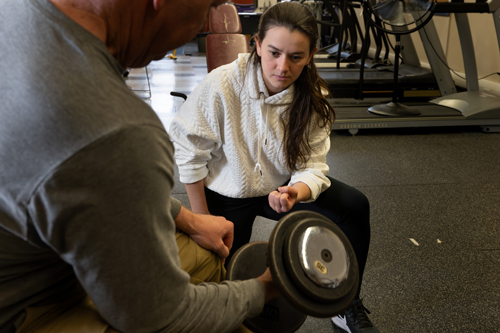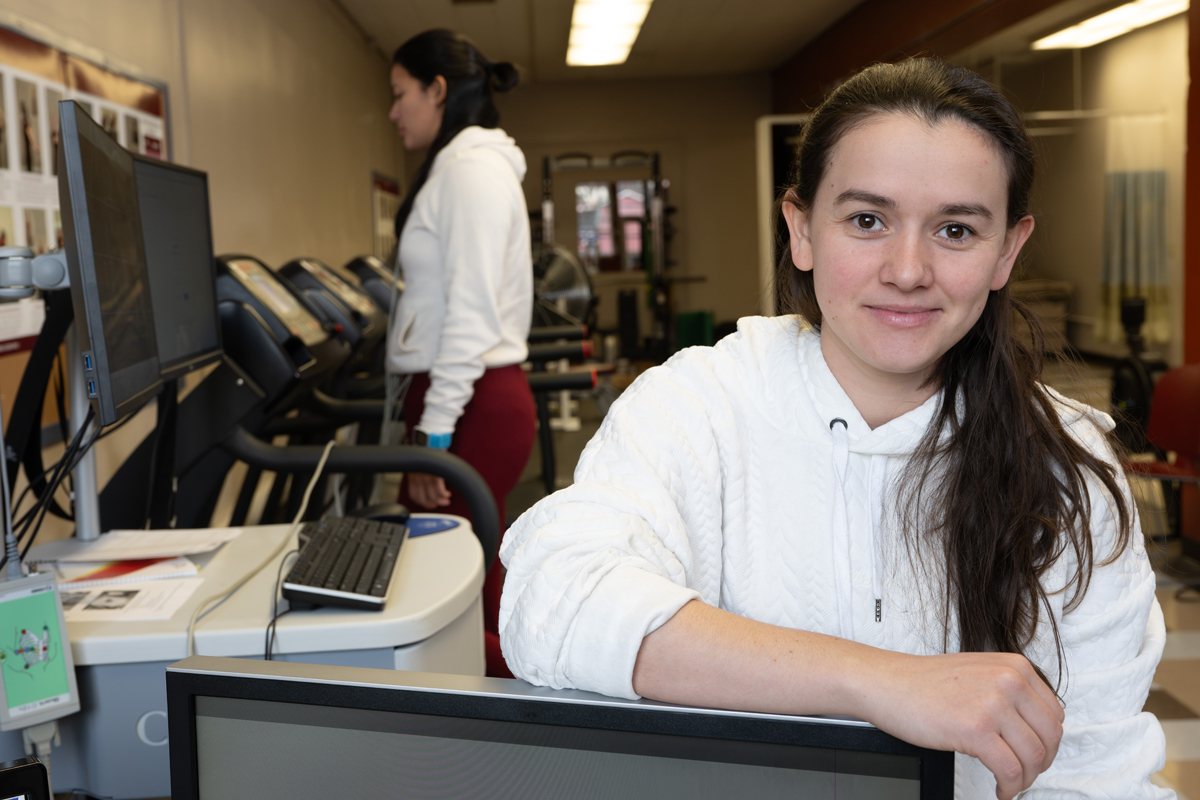By Kyle Spurr, UM News Service

MISSOULA – At first glance, a room in the basement of McGill Hall on the University of Montana campus appears like a private gym with treadmills, dumbbells and exercise bikes.
It seems like a good place for a workout. But the space is actually a research laboratory for students and faculty in UM’s School of Integrative Physiology and Athletic Training within the College of Health.
For the past few years, the Cardiopulmonary and Cancer Rehabilitation Lab has housed undergraduate and graduate IPAT students who study the value of exercise for those with heart conditions and cancer diagnoses. The students helped configure the space, created educational materials and ran tests on one another with the gym equipment and ECG machines.
Later this year, the lab is planning to open to real patients who will allow the students to monitor their health.
“I knew I wanted to replicate a clinical facility on campus and have a real-world setting for our students to train in so they could go to a hospital or outpatient facility and see the same equipment,” said Professor John Quindry, the IPAT chair.
The lab is also run by Amanda Alfaro, an IPAT master’s student from Heredia, Costa Rica. Alfaro wasn’t familiar with Montana until an undergraduate professor in Costa Rica, who knew Quindry, suggested Alfaro apply to UM.
Since arriving in Montana, Alfaro has worked in the research lab nearly every day preparing it for patients.
“It’s been a lot of work, but it is what I want to do,” Alfaro said. “At the end of the day, we do this because we want to see someone get better.”
Alfaro, who will begin her Ph.D. at UM this fall, meets each week with members of Silver Lining Foundation, a group of about 40 breast cancer survivors and patients who train year-round to compete in dragon boat and outrigger canoe races on Flathead Lake.
Alfaro gets professional experience by training some of the newer Silver Lining Foundation members in their facility on the south end of Missoula. The group added more training sessions as its numbers have grown, and Alfaro leads those new sessions.
Nan Condit, president of Silver Lining Foundation and an alumna of UM IPAT with a bachelor’s and master’s degree, said she is happy to support her former school.
Once the rehabilitation lab in McGill Hall opens to patients, Condit will refer new members of her group and others she knows. The lab could even become another location for Silver Lining Foundation to train.
Condit, a 10-year survivor of breast cancer, follows a popular phrase in the athletic training industry: Exercise is medicine.
“Just as pills are prescribed, exercise needs to be prescribed exactly the same way,” Condit said. “My belief is cancer patients need to be prescribed exercise during treatment. And then post treatment.”
Prioritizing exercise as medicine is a motivation for Condit and also a driving force for Quindry and Alfaro as they open the rehabilitation lab.
“I feel like I’m a part of something that is going to be big,” Alfaro said. I’ll look back in a couple of years and know I helped start it.”
The lab will start with welcoming five patients at a time for three-month stints of rehabilitative exercise. The patients will range from cancer survivors to those with stage 4 cancer. Students will monitor and track the patients as they do certain aerobic and resistance exercises.
“This lab is part of this multi-pronged initiative for research, student training, outreach and education,” Quindry said. “We are doing it all.”
Another way IPAT students and faculty are bolstering their outreach is through an upcoming Exercise and Oncology conference July 9-10 at the Ali Auditorium in the College of Education building. The second-annual conference will bring the world’s leading scientists and physicians to present their findings, Quindry said.
Working with real patients in the rehabilitation center along with a world class conference are all ways Quindry prepares students for success after graduation. Alfaro, for instance, plans to use her expertise at a clinic in Montana or back in Costa Rica.
“We want to train students for careers,” Quindry said. “We want to perform outreach to the community. And we are trying to advance our understanding of how healthy lifestyles prevent or mitigate these terrible diseases.”
###
Contact: Dave Kuntz, UM director of strategic communications, 406-243-5659, [email protected]
link

